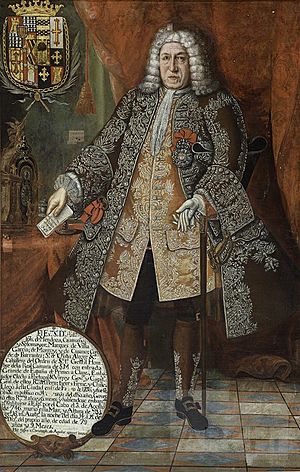José Antonio de Mendoza, 3rd Marquis of Villagarcía facts for kids
Quick facts for kids
Don
José Antonio de Mendoza
Marqués de Villagarcía
Caballero de Santiago |
|
|---|---|
 |
|
| 29th Viceroy of Peru | |
| In office 4 February 1736 – 15 December 1745 |
|
| Monarch | Philip V |
| Preceded by | José de Armendáriz |
| Succeeded by | José Manso de Velasco |
| Personal details | |
| Born | 1667 Spain |
| Died | 17 December 1746 (aged 78–79) Cape Horn, Chile |
| Signature | |
José Antonio de Mendoza (born 1667 in Spain – died 17 December 1746 near Cape Horn) was an important Spanish leader. He served as the Viceroy of Peru from 1736 to 1745. A viceroy was like a governor, ruling a large area for the King of Spain.
Contents
Becoming Viceroy of Peru
José Antonio de Mendoza was from Galicia, a region in Spain. Before becoming viceroy, he was an ambassador in Venice, Italy. He also served as the viceroy of Catalonia, another region in Spain.
In 1735, King Philip V of Spain chose him to be the Viceroy of Peru. He arrived in Lima, the capital of the Viceroyalty of Peru, in 1736. He was 68 years old when he started this important job.
Protecting the Viceroyalty
During his time as viceroy, Spain and England went to war again. This war was called the War of Jenkins' Ear (1739–1748).
Viceroy Mendoza worked hard to protect the Pacific coast. He made the army and local defense groups stronger. In 1742, he sent ships from the port of El Callao to defend the coast of Chile.
Science and Exploration
In 1736, two Spanish scientists, Jorge Juan y Santacilia and Antonio de Ulloa, arrived in Peru. They were part of a French expedition to measure the Earth's shape near the equator. Jorge Juan y Santacilia even traveled on the same ship as Viceroy Mendoza.
Another French scientist, Louis Godin, was also part of this expedition. Viceroy Mendoza appointed him as the cosmógrafo mayor. This job involved creating maps, publishing calendars, and writing guides for sailors. Other French scientists in Peru at this time included Charles Marie de La Condamine and Pierre Bouguer.
Challenges and Changes
During his rule, there were some challenges. In 1739, a revolt by Indigenous people happened in Oruro. Another big revolt started in 1742 in Oxabamba, led by Juan Santos Atahualpa. This rebellion gained support from many native tribes, and even from some mixed-race people (Mestizos) and poor Spaniards. The goal of these rebels was to remove the Spanish from Peru. They did not succeed, but the Spanish also could not fully defeat them.
In 1740, a large part of the Viceroyalty of Peru was separated to form the Viceroyalty of New Granada. This new viceroyalty included areas like Bogotá, Quito, Panama, and Venezuela.
End of His Term
Viceroy Mendoza finished his term in Peru in 1745. He died later that year, on December 17, 1746, while sailing back to Spain.
See also
 In Spanish: José Antonio de Mendoza Caamaño y Sotomayor para niños
In Spanish: José Antonio de Mendoza Caamaño y Sotomayor para niños
 | Aurelia Browder |
 | Nannie Helen Burroughs |
 | Michelle Alexander |

